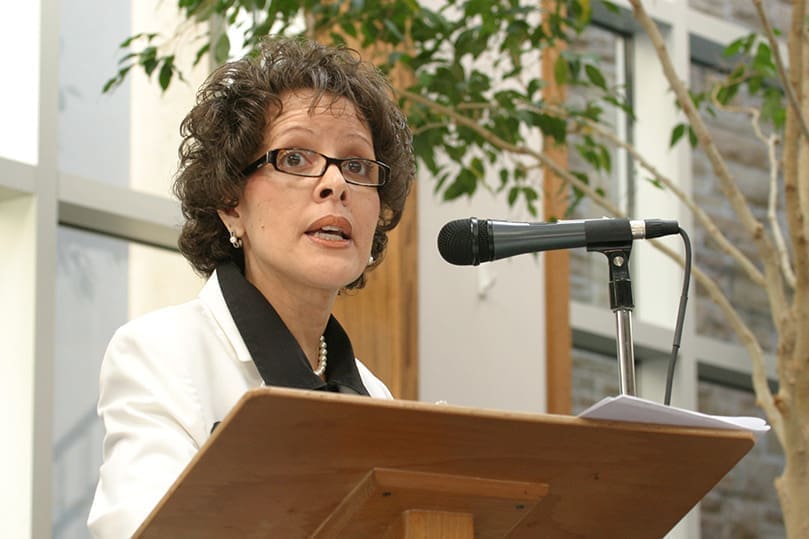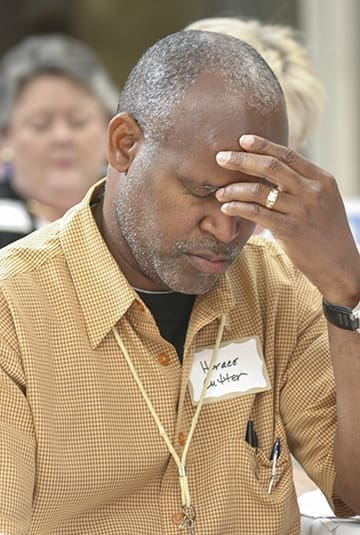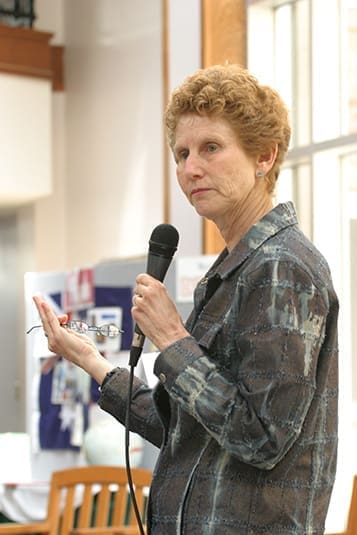 Photo By Michael Alexander
Photo By Michael AlexanderAtlanta
Speaker Recommends Spiritual Connections For Elderly
By REBECCA RAKOCZY, Special To The Bulletin | Published May 8, 2008
A person’s faith and religious life may change as he or she enters into old age, but that doesn’t diminish the need for spiritual connections to nourish mental health.
Finding out how to spark those connections in elderly populations was the topic of the second annual Spirituality in Aging Partnership series, a half-day conference sponsored by Catholic Charities Atlanta.
With keynote speaker Nancy Kriseman, who is a licensed clinical social worker in gerontology and author of “The Caring Spirit,” more than 100 people—comprised of pastoral care staff, personal caregivers and health ministry nurses—were given advice on how to connect to their clients in a more holistic and spiritual way. The gathering took place at Lutheran Church of the Redeemer in midtown Atlanta.
For the event Catholic Charities Atlanta partnered with The Center for Positive Aging, the Georgia Institute on Aging and the Georgia Association of Homes and Services for the Aging.

Horace Cutter, a chaplain at Countryside Hospice, Newnan, bows his head during the opening prayer. Photo By Michael Alexander
Ministering to the elderly population is “an extension of the church’s pro-life ministry,” said Joseph Krygiel, CEO of Catholic Charities Atlanta and the one who introduced Kriseman to the gathering. Regina Harris, Catholic Charities senior resources coordinator, also attended the event.
Kriseman asked audience members about their own definitions of spirituality and spoke about her experiences with her aging parents, while also encouraging the audience to share their experiences. Her mother suffered from Alzheimer’s disease, and died recently; her father had pulmonary lung disease and dementia and passed away several years ago.
“A lot of times we think if an older person was not a spiritual or religious person, they don’t need spiritual care,” Kriseman said. “But the majority of people in the world are spiritual in some way.
“For caregivers it is important to ask the question,” she said. For example, “How do you know the spiritual state of the person who has dementia? If you don’t know, ask their family members, ‘how has their faith carried them through life?’”
Even if the person did not have a strong faith foundation or did not demonstrate that faith to the outside world, spiritual connections can be made through music, like singing a familiar hymn or song, in ritual or prayers, or in comforting scents, like baking bread or cookies, she said. “It can mean asking ‘what does faith mean to you,’ or ‘what does grace mean to you,’” she said. It’s also important that you encourage a spiritual connection by asking questions about pictures of people and things that matter to them, she added. “We need to help our elders find their jingle,” she said.
Connecting with an elder’s spiritual side to “find that jingle” doesn’t have to be reserved for pastors, she said, although she acknowledged circumstances when pastoral intervention was needed.
“The work of the spirit is not just for pastoral folks,” Kriseman said. For caregivers—including those taking care of parents—it’s important to refresh their own spiritual life and not become “dispirited,” especially in the knowledge of an incurable condition, like Alzheimer’s disease, she said.
“People do need the space to grieve every time (their loved one) changes,” she said. “But if you’re caring for a parent, it’s important to remember this is a role change, not a role reversal—your mother will always be your mother.”
Kriseman also encouraged those in attendance to give permission to embrace their own spirituality, even as they care for someone who is not their relative. “Very rarely do caregivers get to talk about their own spiritual care,” she said.

With over two decades of consulting experience in program development and training in assisted living, nursing home, hospice, hospital and home care agency environments, Nancy L. Kriseman serves as the keynote speaker for the event. Photo By Michael Alexander
“It’s a blessing to work with older people—you’re helping them finish well,” she said.
Patti Miller, coordinator of family faith formation at St. John Neumann Church in Lilburn, was listening to Kriseman’s words carefully. Miller came to the conference not only to learn more about spirituality and aging to pass on to her congregation, but also because she has three family members who are elderly.
“This is at the forefront for me,” she said. She came with fellow parishioner Sherry Johnson, who has worked with adult faith formation and RCIA at their church and has been a trauma care nurse for years. “This (spiritual side of care) was not always at the forefront, but it’s becoming more a part of nursing,” Johnson said.
As their parish ages, said Miller, “a lot of families are asking these same questions (that Kriseman brought up.) We wanted to find out what’s new out there from a Christian and Catholic perspective.”
Said Krygiel of Catholic Charities, “ It’s our responsibility to take care of our senior population.” He cited the U.S. Conference of Catholic Bishops 1999 statement, “The Blessings of Age.”
All parishes and churches are called to respond to this,” he said. “We cannot sit idle.”